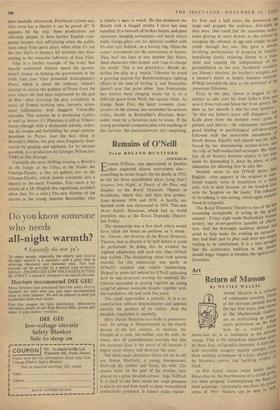Remains of O'Neill
From ROLAND HUNTFORD STOCKHOLM
FUGENE O'NEILL was appreciated in Sweden F when neglected almost everywhere else— something he never forgot. On his death, in 1953, he left his three unpublished plays, Long Day's Journey into Night, A Touch of the Poet, and Hughie, to the Royal Dramatic Theatre in Stockholm, where they had their first produc- tions between 1956 and 1958. A fourth, un- finished work was discovered in 1956. This was More Stately Mansions, which had its world premiere, also at the Royal Dramatic Theatre, last Friday.
The manuscript was a first draft which would have taken ten hours to perform as it stood: Dr. Gierow, the director of the Royal Dramatic Theatre, had to shorten it by half before it could be performed. In doing this he avoided the slightest adaptation, and used only what O'Neill had written. The deciphering alone took several months, for the manuscript was partly in O'Neill's crabbed and cryptic handwriting. Helped by notes left behind by O'Neill indicating how he had proposed revising the material, Dr. Gierow succeeded in piecing together an acting script of almost workable length; together with the translation, the task took five years.
The result approaches a miracle: it is a re- construction without discontinuities and appears entirely the product of its author. And the Swedish translation is masterly.
More Stately Mansions is a study in possessive- ness. Its setting is Massachusetts in the fourth decade of the last century; its medium, the triangle of a man, his mother and his wife; its thesis, that all possessiveness corrupts hut that the maternal kind is the worst of all because it begets most misery and destroys the man.
The three main characters (there are six in all)
are Simon Hartford, a young businessman, Deborah his mother and Sarah, his wife. The drama turns on the part of the mother, here played by a great Swedish actress: Inv. Tidblad. It is hard to say how much her stage presence is due to art and how much to sheer womanhood instinctively projected. It doesn't really matter: SPECTATOR, NOVEMBER 16, I?0 for four and a half hours she dominated tho stage and gripped the audience, first-night as they were. One could feel the incestuous under- tones grating in one's bowels as she refused to recognise the advance of age and sought second youth through her son. She gave a OniellY terrifying performance of progress to insanilYi brutalising Sarah, reducing Simon to a man child and sapping the independence of bee grandchildren on her way. Incidental casualties are Simon's idealism, his brother's scruples. and a banker's belief in honest business O'Neill intended intended the play as the portrayal of the American Dilemma. Early in the play, Simon is begged by his mother to take over his dead father's firm and save it from ruin and hence her from penury'. He' does so, but absorbs it into his own business— 'So that my father's name will disappear.' Jar! Kulle drew from the moment every grain of portent and horror : the subsequent unlicensed greed leading to psychological self-destruction followed with the inexorable smoothness .01 Greek drama. Equally well played was the Wife' forced by her domineering mother-in-law On the role of half-mother-half-strumpet. She tat* fers all of Simon's business empire to her own name by demanding it, piece by piece, as Oa- sideration for allowing him to take her. Swedish seems to suit O'Neill better than English: what appears in the original as oril.e" lieved tragedy turns in translation to a bitter, joke, rich in dark humour, of the Swedish land with the `laughter on the inside.' The influenen of Strindberg is also strong, which again explains Swedish sympathy. The Royal Dramatic Theatre is one of the fell, remaining strongholds of acting in the gran: manner : Friday night made Shaftesbury Aveau, tawdry, our avant-gardistes apostles of affeetad tion. And the first-night audience dressed .3°, acted to help make the evening an occasion' lYx they had their part to play, and were not sirriP waiting to be entertained. It is a nice paradoe that the aristocratic tradition in the then"-, should linger longest in Sweden, the egalitarian Jerusalem.






































 Previous page
Previous page